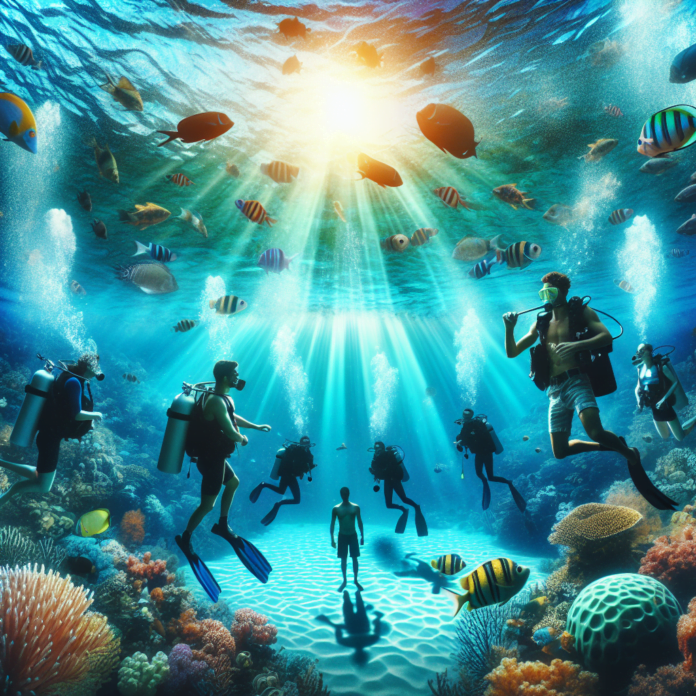While the land presents us with numerous wonders to explore, the ocean, with its mysterious depths and highly diverse ecosystem, offers us a unique adventure which we shouldn’t miss. It’s no wonder that snorkeling and scuba diving are popular recreational activities. Far from merely being intriguing pastimes, these water activities come with a plethora of benefits, some of which go beyond the thrill they provide.
Physical Fitness
Both snorkeling and scuba diving can be great forms of exercise. Snorkeling, with its relaxed pace, encourages muscle movement and flexibility. The resistance from the water strengthens your muscles, especially around your thighs and behind your legs, while the kicking motion promotes joint flexibility.
On the other hand, scuba diving combines swimming, breathing exercises, and movement under water, which together provide a full body workout. These activities increase blood circulation, improve cardiovascular health, strengthen the back muscles, and improve your overall physical fitness.
Stress Relief
The underwater world is a natural masterpiece, almost untouched by the rapid pace of life on land. This tranquility offers a perfect escape from the hustle and bustle of our day-to-day lives. The sounds of waves and bubbles as you exhale, the sight of various marine life, coupled with the feeling of weightlessness, all lead to a meditative state that can significantly reduce stress and anxiety.
Exploring the Underwater World
Snorkeling and scuba diving give you the opportunity to explore the vibrant and diverse underwater ecosystem. It’s like walking into a large natural aquarium as you get up close with marine species that you may never encounter in your lifetime. Exploring various beautiful coral reefs, historic sunken ships, and even underwater caves, give a whole new dimension to adventures.
Enhancing Social Connections
Snorkeling and scuba diving are best experienced with others. You can start a diving club, or join one and meet new people who have the same interests as you. These activities encourage team work and communication, as divers are trained to look out for their partners’ safety. As such, this could be an excellent opportunity to form bond, deepen friendships, and develop empathy.
Benefits to Mental Health
Aside from the physical and social benefits, snorkeling and scuba diving can also provide significant mental health benefits. As you focus on your breathing – similar to the focused breathing of yoga – you can achieve a state of calmness and mental clarity. In addition, observing and being surrounded by the underwater flora and fauna promotes feelings of awe and wonder, which can improve mood, decrease feelings of depression, and lead to greater life satisfaction.
Learning New Skills
Snorkeling and scuba diving are practical ways of learning new skills. You have to learn how to use different gear, understand safety measures, and learn signs and signals. The process of acquiring these new skills can enhance your self-esteem and confidence.
Conservation Awareness
Last but not least, snorkeling and scuba diving increases awareness of the need for ocean conservation. Being directly exposed to the beauty and fragility of the underwater world can ignite a desire to protect it, leading to more environmentally responsible behaviors.
Conclusion
Snorkeling and scuba diving offer an exciting way of exploring the world. From improving physical and mental fitness to enhancing social connections, these activities offer you more than just the thrill of an adventure. They place you in environments that most people only dream of experiencing and give you a firsthand realization of the delicate beauty of the underwater ecosystem. So, whether you pick up snorkeling or scuba diving as a hobby, know that you’re diving into a world of numerous benefits.
Frequently Asked Questions
1. Is snorkeling suitable for those who can’t swim?
Yes, snorkeling can be enjoyed even by non-swimmers. However, it is advisable to wear a life jacket for safety and always to be accompanied by an experienced guide or swimmer.
2. Is scuba diving dangerous?
Like any other sports or recreational activity, scuba diving has inherent risks, but proper training, use and maintenance of equipment, and observance of safety practices can significantly minimize these risks.
3. Who can go for snorkeling and scuba diving?
Pretty much anyone who is in good general health can enjoy these activities. However, people with certain medical conditions, such as heart or lung issues, should consult their doctor before taking up snorkeling or scuba diving.

